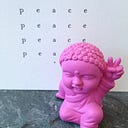Member-only story
How to Be Present: Using Wordless Sound to Connect Body and Mind
Sometimes I read poetry aloud to my partner. I love the poetry. I love the pleasure it gives him. And, I admit, I love the opportunity for the mini-performance. Our habit is for mornings, before we get out of bed. Propped up on my pillows, it’s one of the only times I wear my reading glasses (which I hate for the way they make me feel old, except for this moment of poetry, when I slip the bonds of age). I mostly read electronic books now (oh the privilege of adjustable font sizes, which help us feel young again). But, for our poetry custom, the books have to be old-fashioned-hold-in-the-hand-and-turn-the-page. I don’t know why I need this tactile experience, though I may have felt the beginning of an answer.
Right now, we are immersed in (and loving) Joy Harjo’s Conflict Resolution for Holy Beings. (We like to read through a poet’s entire book, before moving onto the next.) The other morning, I came across a poem interspersed with lines of italicized words I didn’t know.Wey yo hey, wey yo hey yah /hey.As I read, a series of strong emotions swept through me — sadness, longing, love. I was a bit embarrassed. I am often overtaken by the emotion of a poem while I’m reading, but, in this case, I didn’t even know if I was reading properwords. Yet, I could feel meaning as I spoke the syllables aloud. They compelled a chant.
